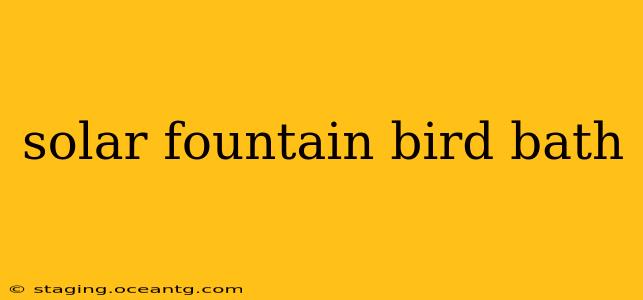Bring the beauty and tranquility of a water feature to your garden with a solar-powered fountain bird bath. These charming additions not only provide a refreshing drink and bathing spot for your feathered friends but also add a touch of elegance to your outdoor space. This guide will explore the various aspects of solar fountain bird baths, helping you choose the perfect one and ensuring its longevity.
What are the benefits of a solar fountain bird bath?
Solar fountain bird baths offer several advantages over traditional bird baths:
- Eco-friendly: They harness the power of the sun, eliminating the need for electricity and reducing your carbon footprint.
- Low maintenance: No need to plug them in or worry about electrical cords. Simply place them in a sunny spot and let the sun do the work.
- Quiet operation: Unlike electric pumps, solar pumps are typically very quiet, creating a peaceful atmosphere in your garden.
- Attractive design: Many solar fountain bird baths come in a variety of styles and designs, complementing any garden aesthetic.
- Beneficial for wildlife: Providing a clean water source for birds and other small animals promotes biodiversity in your garden.
How do solar fountain bird baths work?
These delightful garden features operate using a simple yet ingenious system. A solar panel converts sunlight into electricity, powering a small pump that circulates water within the bird bath. This creates a gentle, flowing water feature that attracts birds and adds a calming soundscape to your outdoor environment. The constant movement of the water also helps to keep it clean and aerated, preventing the growth of harmful bacteria.
What are the different types of solar fountain bird baths?
The market offers a wide variety of solar fountain bird baths, varying in size, design, and features. Some popular types include:
- Traditional bowl style: These classic designs offer a simple, elegant aesthetic, perfect for any garden.
- Multi-tiered designs: These offer more bathing space and create a more visually interesting water feature.
- Decorative styles: Many options incorporate intricate designs and sculptures, adding a unique focal point to your garden.
- Material variations: Bird baths are commonly made from materials such as ceramic, resin, and metal, each offering a distinct look and level of durability.
How much sunlight do solar fountain bird baths need?
To ensure optimal performance, your solar fountain bird bath needs ample sunlight. Ideally, position it in a location that receives at least 6-8 hours of direct sunlight per day. Less sunlight will result in a weaker flow or the pump not operating at all. The amount of sunlight directly impacts the pump's ability to circulate water effectively.
How do I clean my solar fountain bird bath?
Regular cleaning is crucial to maintain the health of your feathered visitors and the longevity of your bird bath. Cleaning should be done at least once a week, especially during warmer months. Use a brush and mild soap, rinsing thoroughly with clean water. Avoid using harsh chemicals, as these can harm birds. Regular cleaning prevents algae buildup and keeps the water fresh and clean.
What are the common problems with solar fountain bird baths and how can I fix them?
While generally low-maintenance, solar fountain bird baths can occasionally encounter problems:
- Weak or no water flow: This often results from insufficient sunlight, dirty or clogged pump, or debris in the water. Cleaning the pump and ensuring adequate sunlight are usually the solutions.
- Pump malfunction: If the pump is not working properly despite sufficient sunlight and cleaning, it may need replacement.
- Algae growth: Regular cleaning is crucial to prevent algae growth. Consider using an algae treatment specifically designed for bird baths, if necessary.
By following these tips and choosing a bird bath that suits your needs and aesthetic preferences, you can create a beautiful and functional haven for your garden's avian guests. Remember, providing a clean and refreshing water source isn't just aesthetically pleasing; it's an important contribution to supporting local wildlife.
